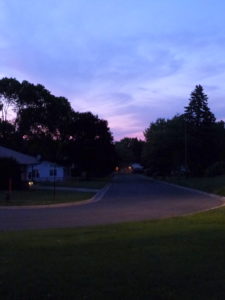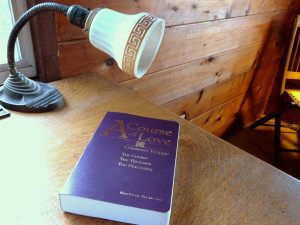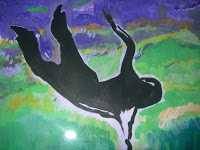 Relationship and union are the way of God. The way of heart and mind, body and soul, heaven and earth. God is being in unity and relationship. So are you. D:Day37.6 (emphasis added)
Relationship and union are the way of God. The way of heart and mind, body and soul, heaven and earth. God is being in unity and relationship. So are you. D:Day37.6 (emphasis added)
After weeks of walking in the evening rather than in the morning, I ask myself, What’s with me? Why this change? How profound of a change is it? I come in and smell like the outside, just like the kids did when they were little. Do I ever remember coming in this way myself, with the fresh air clinging to me? With images of the simple lawns and homes of the neighborhood imprinted on me: of cottontails eating clover, red wheel barrow leaning against garage, pink plastic watering can on its side in garden, lime green beach ball nearly hidden between bushes, grey cat in window, shade pulled halfway over small round table, lamp lit in twilight.
All of it beaconing to me, to a deep welling over of memory and thought, particularly of times when I didn’t question as gently as I do now, in which I felt downright fraudulent for not feeling “all one way.” What is this questioning, I wonder, if not of the sense, implanted for so long, that there is an either/or nature to life?
Paradox has been with me lately, and even still, here I am, questioning myself as I change: What’s with me?
Then I realize the whole idea has been brought up because I need to write about this. A gentle musing kind of writing…because there was a time, not so long ago, that I could barely accept the both/and in myself.
As Parker Palmer says, we “Fail to embrace the paradoxical nature of the human self.” And as Jesus says, we were taught not to. Jesus goes right to the separation of head and heart, but in my memory I think of “Be a big girl now.” That’s my first memory of it, as if a day came that drew a line between being a little girl and being a big girl. How, when we’re “little,” do we understand what being a “big” boy or girl means?
It’s no wonder you and I can spend a lifetime coming back from all those lines that were drawn. It’s no wonder it takes a while to accept the both/and message of A Course of Love.
Jesus does a lot of talking about both/and before he uses those words. He speaks of the way of the world as one that separated not only heart and mind, but thoughts and feelings, men and women, and of course the ever present good and bad. I wouldn’t be surprised if our current election in the U.S. isn’t one of the biggest demonstrations ever of this penchant, which is not only a penchant to separate but an acknowledgment that separation uses judgment, sometimes by way of facts, sometimes by way of bias, sometimes by way of meanness, and sometimes simply by ignorance or ego. This separation makes us distant from ourselves and others, ourselves and the life we’re living. It causes a separation between theory and practice, and solitude and community too. Endless divisions, including the division between humanity and divinity.
But what I’m looking at is the simple things in life right now. For instance, I might have said about recent travels: “I loved it, but I was anxious about public speaking.” What a different statement to say, “I loved it, and I was anxious about public speaking.” Or how about this more general one: I accept change but it confuses me . . . adjusted to . . . I accept change and its confusion? Everything becomes more gentle with that simple admission of “and.” “I love you and I’m angry.” How different than “I love you, but I’m angry!”
In A Treatise on the Personal Self, we hear:
“You cannot have an idea of goodness without having an idea of evil. You cannot have an idea of an ideal state without having an idea of a state that is not ideal. You cannot have an idea you call “right” without believing in an idea that can be “wrong.” The ego made such ideas necessary for the idea of the ego was “wrong” or inaccurate. The only way to bring that inaccuracy to light was through contrast. To function from an inaccurate foundation was to build upon that foundation. Building a structure with a foundation that would not support it was the folly that the ego made of life. The only way for such an error to be seen as an error was through its dysfunction. The only way to correct such an error is to dismantle the structure and begin again with a foundation capable of being built upon. This is what we have done. We have taken away the foundation of illusion, the one error that became the basis of all that came after it. You cannot make another error such as this for it is the one error. Does it not make sense that the only error possible is that of not being who you are? (4.3-4.6)
I love it that this ends with “the only error possible is that of not being who you are.” I’ve seen that I can’t accept who I am without accepting paradox. One meaning of paradox I like is this: a statement that seems contradictory, unbelievable, or absurd but that may be true.
In ACOL, many statements that tell us that we are both human and divine would fit this definition. These passages are from The Dialogues, Days 10 and 36:
I have spoken with you throughout this time as the man Jesus so that you realize that man and Christ-consciousness can be joined. That you, as man or woman, existing in this particular time and space, can join with Christ-consciousness. You can be both/and, rather than either/or. 10.21
Yet you do not disappear or cease to be. You are not replaced by God whom you have always been one with in being. You simply accept the truth of being and the truth of being in union and relationship. Both at the same time. Both/and rather than either/or. Cause and Effect. Means and End. You accept the end of choice and the beginning of creation. 36.18
The result of a world in which paradox is accepted may range more toward the bewildering and unknown than the tried and true, but it gives life back to us, and us back to life. I know it’s essential for this time of creation of the new. And it’s so exciting! Almost everything I look at these days is being greeted with, “In what way can I do this newly?” What a gift that is!

I don’t know that a time of being undone by the perplexities of paradox doesn’t await each of us. It sure did me. For many years after A Course of Love came to me, I struggled with the dichotomies of my life in those big, “undoing” ways. During one such time I painted this picture and called it Falling through Twilight. Things were so mixed up in me that I needed to do something different to get at what I was feeling, and what I did, for a short while, was paint. And I used to say, “I’m a writer, but I paint occasionally, and not well!”


Mari, I love this both/and theme. I’ve written a poem, maybe you have read it already, but all week it came to me to post it in response to your thoughtful writing/and painting!
BOTH AND—-
Good and bad
Chase each other around in a circle
Until
No one knows which is which.
Right and wrong
Keep borrowing each others clothes
Until
It’s likely people are getting fooled.
Strength and weakness
Keep morphing into each other
Until
Each contains the other.
What to do in circumstances like these?
Maybe
We can stop with the labels
And acknowledge that contradictions reveal truth.
Meanwhile we don’t have to understand a lot
In order to dance a dance
Of gratitude
The way a puppy does
When it knows you are making its meal
Turning in circles and leaping about
Little paws clicking on the floor
In ecstasy.
Paula Payne Hardin
July 30, 2013
Thank you, Mari. This is a beautiful and helpful reflection on the paradox of both/and. So clear and refreshing.
I had goose bumps shiver all over reading this!
I love giving you goose bumps, Mary!
So now you’re a writer and you paint occasionally? I like this “and” instead of “but”!
Well it would be great if I was still painting…or wait a minute…maybe that doesn’t matter!